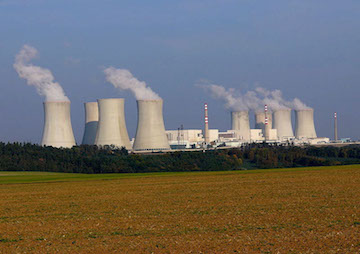A Big Fat Radioactive Lie
Billionaires are hyping nuclear power as a magic cure for climate change. But there are many reasons why governments should resist their call to pump more tax dollars into nuclear energy. Wikimedia
Wikimedia
By Emily Schwartz Greco / OtherWords
This piece ran on OtherWords.
Not long ago, no billionaire worth his cufflinks would be caught dead without hurling bales of money at our nation’s educational system. They bankrolled charter schools, high-stakes testing, and the splintering of big high schools into smaller academies. Their failure to make American kids learn more scuffed the luster on this enduring philanthropic fad.
Billionaires have landed, therefore, on a new mission. As Donald Trump might say, they want to make nuclear energy great again.
“If we are serious about replacing fossil fuels, we are going to need nuclear power,” PayPal co-founder and Facebook mega-investor Peter Thiel crowed in a New York Times op-ed shortly before negotiators from 195 nations gathered in Paris to seal an international climate pact.
Thiel, who personally invests in nuclear energy, made the self-serving demand that the U.S. government forge a “plan to fund and prototype the new reactors that we badly need.”
In other words: What does a guy like me with only $2.2 billion to my name gotta do to get my corporate welfare handout?
Bill Gates is also advocating heavy public investment in novel designs that these nuclear cheerleaders swear will be safer and cheaper than the 391 reactors that now generate about one in 10 watts around the world.
As the Paris climate talks got underway, the Microsoft co-founder launched an unprecedented multibillion-dollar “clean” energy fund, backed by the U.S., Chinese, and Indian governments, as well as other billionaires and some foundations. Don’t be surprised if it’s nuclear-friendly.
The crowd of rich men with tech cred dipping their toes in these radioactive waters also includes Amazon titan Jeff Bezos and Paul Allen, Gates’ fellow Microsoft co-founder.
But there are many reasons why governments, including our own, should resist their call to pump more tax dollars into nuclear energy. Namely:
Reactors are expensive, they’re very difficult to shield from terrorist and other security threats, and they’re prone to catastrophic accidents that have created ghost towns in Japan and the former Soviet Union. Furthermore, there are still no solutions for meeting the daunting challenges of safeguarding nuclear waste and cleaning up abandoned uranium mines.
And nuclear power takes too long to crank up. Remarkably, five of the 62 reactors under construction worldwide have been in the nuclear pipeline for three decades. It’s too slow to stop the climate crisis.
Besides — to a much greater extent than solar and wind power — nuclear energy emits its own carbon pollution. Those greenhouse gas emissions come largely through the use of fossil fuels in activities like reactor construction, waste transportation, and uranium mining.
More importantly, successful businessmen ought to be able to spot an uncompetitive industry when they see one.
Here’s what Lazard, an investment bank with $180 billion under management, has to say about today’s top energy options: Utility-scale “wind and solar are much cheaper than gas and coal, and less than half the cost of nuclear.”
Renewable energy’s competitive edge makes it no surprise that generation from solar power is now growing exponentially and wind power has been expanding by more than 20 percent annually for the past seven years around the world as nukes have fumbled. The total amount of global nuclear energy remained well below 1996 levels in 2014.
A total of four new nuclear reactors in Georgia and South Carolina are at least three years behind schedule and billions of dollars over budget. That bodes badly for the save-our-nukes billionaire class because (sorry, guys) those power stations were supposed to be models for ramping up nuclear energy quickly without cost overruns.
I wonder what they’ll choose as their next losing battle.
Emily Schwartz Greco is the managing editor of OtherWords, a non-profit national editorial service run by the Institute for Policy Studies. OtherWords.org.
Your support matters…Independent journalism is under threat and overshadowed by heavily funded mainstream media.
You can help level the playing field. Become a member.
Your tax-deductible contribution keeps us digging beneath the headlines to give you thought-provoking, investigative reporting and analysis that unearths what's really happening- without compromise.
Give today to support our courageous, independent journalists.






You need to be a supporter to comment.
There are currently no responses to this article.
Be the first to respond.